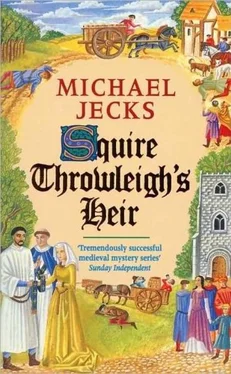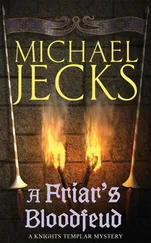Michael Jecks
SQUIRE THROWLEIGH’S HEIR
1998
Historical novels present some unique problems for the author. A plot may form with great clarity and precision in the author’s head – books often more or less write themselves once the characters have been fleshed out – but what sort of vocabulary should one use to tell a story, set like this one, in the 1300s?
English is an astonishingly rich language, with a fabulous bank of old or ancient words upon which an enterprising novelist can draw to add authenticity. By throwing in references to, for example, a ‘misericord’ – the dagger used by knights to put an enemy out of his misery, or a ‘falchion’ – a heavy-bladed, single-edged sword used by some men-at-arms, and by mentioning trailbastons and shavaldours, crucks and cob… one can delight those readers who enjoy discovering medieval terms.
And yet no one could write an entire story using the same vocabulary which was current in the 1300s.
English in those far-off days was a mixture of Latin, Norman French, German, Saxon, and even some Arabic – utterly incomprehensible to most of us in the late twentieth century. Any person doubting this should get hold of a copy of Chaucer’s Canterbury Tales in its original form, unedited and untranslated; I defy anyone to understand a single line.
Even apparently familiar words can fool the casual reader; our modern interpretation will often be completely different from that understood in centuries gone by. For an easy example, look at the word ‘nice’: its meaning has altered from ‘foolish’ or ‘stupid’, ‘extravagant in dress’, and ‘slothful’ in the 1300s, through ‘particular’ and ‘precise’ in the 1600s, to its present meaning of ‘agreeable’.
Many writers try to get around this problem by giving a spurious patina of authenticity to their work. They throw in the odd ‘Gadzooks’ in the hope that it will lull the reader into believing that they have researched their subject carefully. Reader, beware! ‘Gadzooks’, for example, was first recorded in the late 1600s, so would be completely out of place in one of my novels. Most people recognise words of this nature because they were used by Shakespeare, and link that later medieval period with earlier times, but people in England and their language changed massively between 1300 and 1500.
I have deliberately chosen to write my stories in the language of today, having made the simple assumption that if an English reader were to buy a copy of War and Peace by Tolstoy, or even The Three Musketeers by Dumas, he or she would expect the Russian and French texts to have been translated; likewise the work of Geoffrey Chaucer.
But there is another problem, of course. If one writes in the language of today, one may be tempted to use words that couldn’t have been in common parlance in the historical period in question. I recently received a letter of complaint on exactly that point: the lady was irritated that I had used words like ‘posse’ and ‘gang’, along with ‘thug’ and ‘lynch’. She said that these words were too modern for her taste and dragged her back from the 1300s to the present, distracting her from the main story.
It is a difficult charge to answer, because it shows precisely the double-sided problem confronting a writer of historical novels.
Take ‘posse’. Most people associate this word with cheap extras playing a band of grubby cowboys in a Hollywood Western; in reality, it is a very ancient word; ‘posse comitatus’ was a legal term defining a group of armed men or an armed force, and ‘posse’ was certainly in use in 1300; at the same time ‘gang’ was being used as a collective term for a group of things or people. Thus these two words were actually correct for the period, and the fact that they are still in use today is hardly my fault! In the case of ‘thug’ and ‘lynch’, ‘thug’ has been known in English only since the 1600s, and ‘lynch’ since the 1780s; if a writer were to exclude any words which have come into use over the last two hundred years – or, worse, four hundred – he or she would find it next to impossible to write anything!
Writing an historical novel is therefore fraught with dangers; one faces upsetting some folk by using archaic, incomprehensible terms, and alienating others by employing words which are simply too contemporary. All I can do is plead the best of intentions and try to steer a middle road in the hope that people will enjoy my books for what they are: lively medieval mysteries that spring from my own overheated imagination!
It is time now to apologise to those readers who expect to find an accurate local history within these pages. In Squire Throwleigh’s Heir I have shamefully misused north-eastern Dartmoor. There was no manor west of Throwleigh towards Shilstone to the best of my knowledge; its existence was invented by me for the benefit of the story.
Nor was there ever a Squire Roger with a son called Herbert. I am not aware of the existence of a real James van Relenghes, nor his guard Godfrey, Thomas of Exeter, Stephen of York, or of any of the other characters.
However, similar incidents to those portrayed in this novel did happen. Men and women who had been freed from their serfdom were sometimes appallingly badly treated, their status as freemen being denied by avaricious lords and ladies. For one real-life example of sheer greed, look to Countess Margaret of Norfolk, who challenged poor Alice Comyn, accusing her of not being a freewoman. Alice’s father had been made free by Earl Thomas, the Countess’s father, but the Countess found a loophole: Earl Thomas’s estate was under an entail such that the Earl couldn’t alienate property except during his lifetime. Thus, the Countess argued, Alice couldn’t be free. On the Earl’s death, Alice’s father’s rights to freedom were automatically revoked, as were those of all his children.
This was sharp practice of the worst kind, but it wasn’t the only example. Other cases abound.
In the same way, I have not invented ‘Conventionary Tenure’. This unpleasant form of tenancy came into existence during the early 1300s in the earldom of Cornwall, and appears to have been used around the western borders of Devon too. Under its terms, people could be thrown from the land they and their forefathers had held for decades simply because another person offered a higher rent. Fortunately, not all landlords took part in this.
One last word is important, I feel. In this novel, I have made some comments on the English martial arts. Some may doubt that there were expert English fighters because over the years we have happily forgotten these predecessors of modern boxing.
However, although now it is considered wrong for people to learn to use weapons, and the police control all access to firearms for even target purposes, this is an extremely recent development. In previous decades the British have led the world in methods of self-defence because we have traditionally believed in the right to ‘keep and bear arms’ to protect ourselves from foreign invasion or against overbearing governments in London. In both world wars this century, it was the rifle and pistol shooters of Great Britain who were first to join the Army. The proof of this lies in the archives of clubs such as my own; over half its members were wiped out during one day on the Somme.
Throughout Britain’s long history, skills and techniques have been passed down that have enabled our fighting men to win battles all over the world. For instance, our sailors were still learning sword-fighting with sabres up until very recent times – skills which were recorded before the Conquest.
Читать дальше












